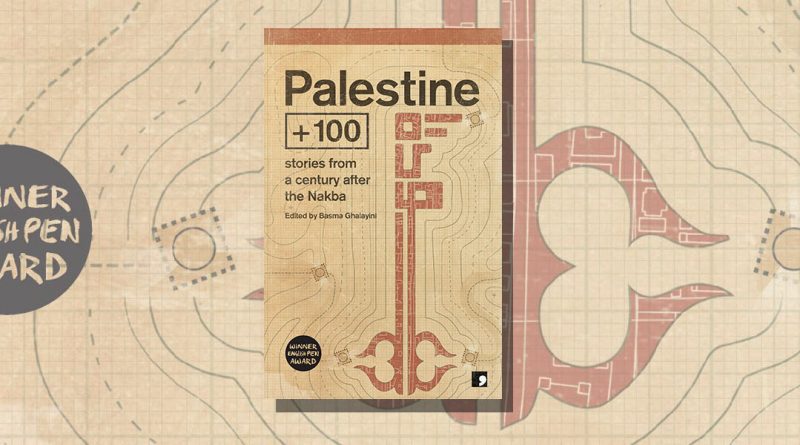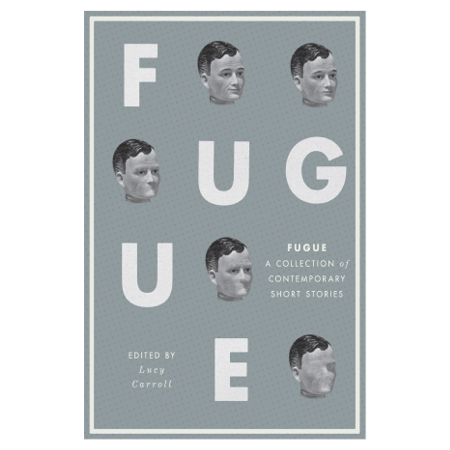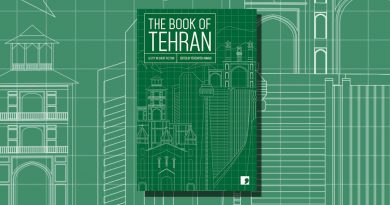Palestine + 100 edited by Bhasma Ghalayini
-Reviewed by Dipika Mummery-
Those of us who love science fiction are probably well used to stories imagining what many countries around the world might look like in the near or distant future. But this type of fiction from Palestinian writers is so rare that Palestine + 100 has been billed by publisher Comma Press as “probably the first anthology of science fiction from Palestine ever”.
The collection comprises twelve stories imagining life in Palestine a century after the Nakba of 1948, when hundreds of thousands of Palestinian Arabs were forced from their homes.
This is an event that I didn’t know all that much about before reading Palestine + 100, and I was grateful for the opportunity to read a variety of perspectives on the Nakba and its repercussions – both real and imagined – from Palestinian writers.
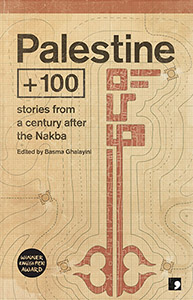
Editor Bhasma Ghalayini explains in the introduction that science fiction isn’t a well-traversed genre for Palestinian authors for several reasons, which made me all the more intrigued to see what the stories would be like.
I was soon struck by how many of the tales took the technology of today’s always-on and constantly-surveilled age and ran with it to various conclusions.
The opening story, ‘Song of the Birds‘ by Saleem Haddad, is a haunting piece about the insidious uses of technology for war, where the protagonist, Aya, realises that the world she thinks is real is in fact a simulation created by Israelis and has to choose whether to stay there or see what reality is like.
As well as the science fiction element, the story serves another purpose by commenting on the weight of memory and how expectations stemming from the past can press down on the young struggling to survive in the present day.
As Aya’s brother says: “We’re just another generation imprisoned by our parents’ nostalgia.”
In the more upbeat ‘Digital Nation‘ by Emad El-Din Aysha, a group of hackers create a virtual government for Palestine through a clever game that encourages players to get involved with the day-to-day running of the country – a utopian imagining that stands out in the collection.
Selma Dabbagh’s ‘Sleep It Off, Dr Schott‘ examines a surveillance state taken to extremes and is told from the point of view of a woman tasked with spying a pair of scientists, one from Palestine and one from Israel, who are suspected of being too friendly with each other. She wryly comments that the powers-that-be are particularly paranoid about who fraternises with who:
“Now that’s the one thing they can really police in Deir el Balah. Thieves might climb through your window every night, drones circle your toothbrush, rubbish stacks up to the sky, but just think about touching a man and you’ll be strung up on a phone mast by the morning.”
Other stories stray into more experimental waters. Abdalmuti’s ‘Personal Hero‘ sees time fly forward and then backwards again as a Palestinian hero is brought back from the dead. Meanwhile, ‘The Curse of the Mud Ball Kid‘ by Mazen Maarouf is a riotous yet sad ghost story of sorts, populated with memorable characters and a plot involving robomicrobes, energy that can move between living beings, and the stolen imaginations of children:
“The stolen imaginations were gathered together inside an artificial satellite that orbited directly above us… [It] had the ability to beam the children’s imaginations back into the past, where they took shape in the form of 3D games in front of other children – hungry, naked children with shaved heads who are said to be held in camps.”
Palestine + 100 can be a difficult read at times due to how affecting the stories are – I had to take a break between each story to avoid being overwhelmed by the reality of what Palestinians have been going through for decades, which I all too guiltily know is not an option that they have.
However, the stories in this collection are shot through with so many different emotions – hope, despair, amusement, fear and longing – that it would be unfair to call it a heavy or depressing read. It’s certainly a thought-provoking and inspiring book for those privileged enough to imagine a future that doesn’t have the weight of a very real history of conflict and displacement bearing down on it.
Visit the Comma Press website to read more about Palestine + 100
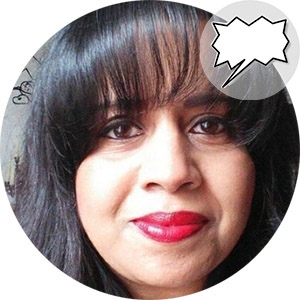
Reviewed by Dipika Mummery — Dipika is a short story writer from Manchester who is gearing up to have a go at a novel. Her day job is in digital content, and she is a voracious reader, frequent gamer, occasional baker and barely competent runner.
Twitter: @DipikaMummery | Website: dipikawrites.wordpress.com

